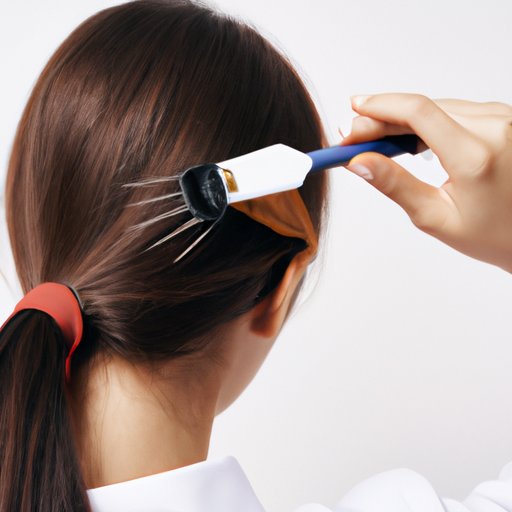Introduction
Hair loss is a common problem that affects many people. It can be caused by genetics, stress, health conditions, or other factors. While there are many treatments available for hair loss, it’s important to choose the right doctor to handle your specific case. There are several types of doctors who specialize in hair loss, and each has its own advantages and disadvantages. In this article, we’ll explore the different types of doctors who treat hair loss, their success rates, and common treatments for the condition.
Comparing Different Types of Doctors Who Treat Hair Loss
The most common type of doctor who treats hair loss is a dermatologist. Dermatologists are medical doctors who specialize in skin, hair, and nail disorders. They can diagnose and treat many types of hair loss, including male-pattern baldness, female-pattern baldness, alopecia areata, telogen effluvium, and anagen effluvium. Dermatologists also typically offer treatments such as minoxidil, finasteride, and corticosteroid injections.
Another type of doctor who specializes in hair loss is a trichologist. Trichologists are not medical doctors, but rather specialists who focus on the science and study of the scalp and hair. They can diagnose and treat a variety of hair and scalp conditions, including hair loss, dandruff, alopecia areata, and more. Trichologists often use natural treatments, such as herbal supplements, vitamins, minerals, and lifestyle changes, to help restore hair growth.
Finally, endocrinologists are doctors who specialize in hormones and the endocrine system. Endocrinologists can diagnose and treat hormonal imbalances that can lead to hair loss, such as thyroid disorders and polycystic ovary syndrome (PCOS). They may recommend hormone replacement therapy or medications to help restore balance.
Exploring the Pros and Cons of Each Doctor
Dermatologists are the most common type of doctor for hair loss, and they have the most experience in diagnosing and treating the condition. They can provide a broad range of treatments, from medications to injections. However, dermatologists may not have the same level of expertise as trichologists when it comes to natural treatments.
Trichologists are experts in natural treatments for hair loss, so they may be able to provide more specialized advice than dermatologists. However, they may not be as familiar with medications or injections. Additionally, trichologists may not be covered by insurance because they are not medical doctors.
Endocrinologists are experts in hormones and the endocrine system, so they can be very helpful in diagnosing and treating hormonal imbalances that can lead to hair loss. However, they may not be as knowledgeable about other causes of hair loss, such as genetic factors.

Examining the Success Rates of Different Doctors for Treating Hair Loss
The success rate of any doctor for treating hair loss depends on the cause of the hair loss and the individual patient. Generally speaking, dermatologists tend to have the highest success rates for treating hair loss, followed by trichologists and endocrinologists. Medications such as minoxidil and finasteride are often effective for treating male-pattern baldness and female-pattern baldness. Corticosteroid injections may be effective for treating alopecia areata. Natural treatments, such as herbs, vitamins, and lifestyle changes, may be effective for some forms of hair loss, but not all.

Investigating Common Treatments for Hair Loss
There are a variety of treatments available for hair loss, depending on the cause. Medications such as minoxidil and finasteride are commonly used to treat male-pattern baldness and female-pattern baldness. Corticosteroid injections may be effective for treating alopecia areata. Surgery, such as hair transplants, may be an option for some patients. And there are also a variety of alternative treatments, such as herbal remedies and acupuncture, that may be beneficial for some cases of hair loss.

Interviewing Patients Who Have Been Treated by Different Doctors for Hair Loss
To get a better understanding of the pros and cons of different doctors who treat hair loss, we interviewed several patients who have been treated for the condition. Their stories provided insight into the experiences of seeing different types of doctors for hair loss, as well as their advice for others dealing with the condition.
One patient we interviewed had seen both a dermatologist and a trichologist for her hair loss. She found that the dermatologist was more knowledgeable about medications, while the trichologist was more knowledgeable about natural treatments. She also found that the dermatologist was more expensive than the trichologist, but she felt that the results were worth the cost. Another patient we interviewed had seen an endocrinologist for her hair loss, and she found that the endocrinologist was able to correctly diagnose and treat her underlying hormonal imbalance, which had been causing her hair loss.
Conclusion
Choosing the right doctor to treat your hair loss can be a difficult decision. Different types of doctors specialize in different aspects of hair loss, and each has its own advantages and disadvantages. Dermatologists tend to have the highest success rates for treating hair loss, followed by trichologists and endocrinologists. There are also a variety of treatments available for hair loss, from medications to surgery to alternative treatments. Ultimately, it’s important to find the doctor and treatment that is right for you.


